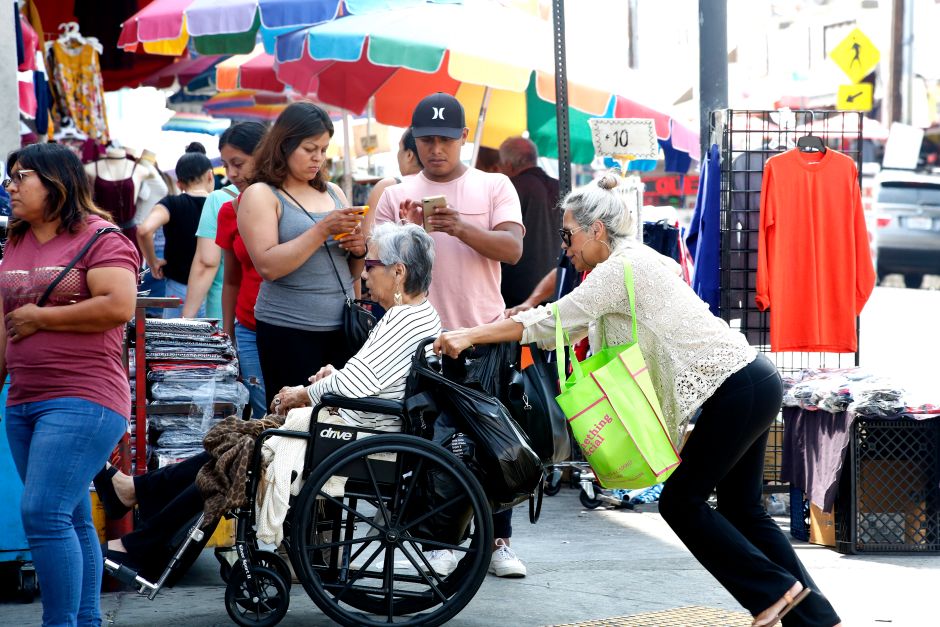
County launches ‘No Go Back’ plan to minimize social injustices.
Zurisaday Arreola, a 16-year-old student with an achievement of 3.8 at Méndez High School, remembers when five years ago in the high school where she was studying, the principal and a police officer unexpectedly entered class, took her out, searched her and searched her with a metal detector. backpack. Then they let her go.
The authorities had chosen her at random, but since then her companions viewed her with suspicion; In doing so, the principal and the agent had criminalized her, made her unnecessarily a suspect in the eyes of the students.
Zurisaday said that experience led her to join the InnerCity Struggle organization, where she has become a leader of countless young people who have led lives like hers.
“My dad is a carpenter, but he is also proud to have a degree in political science from one of the most prestigious universities in Latin America, the National Autonomous University of Mexico:”, Zurisday commented, “but, unfortunately, his degree is not recognized in this country. My parents are undocumented immigrants from Mexico ”.
One day when the mother was taking Zuridasay to a concert, the mother was driving and she was so nervous when she saw a patrol car that she stopped and the officer ordered her to stop. Zuridasay, who was a girl, cryingly asked the policeman not to deport her mother.
These kinds of experiences have been in her 16 years of life on a regular basis, but with the arrival of the pandemic, the young woman confirmed how social and economic differences can further harden the circumstances of many Angelenos.
Due to the contingency, his father lost his job, the family did not receive help due to the immigration status of their parents, on top of that there is the risk of what could happen if someone in the family becomes ill without insurance. Life changed and Zurisaday, who had to take her classes online, had no computer or a reliable WiFi signal.
Luckily InnerCity Struggle gave her and her sister laptops and seamless access to classes. The young woman can now continue her dream of studying Political Science like her father, and in the meantime she sets out to support a Los Angeles County initiative called Don’t Go Back.
It is a comprehensive action plan that recognizes that if before the pandemic in Los Angeles there was racism, discrimination and inequality in every area of the life of Angelenos, the health contingency came to reflect disparities like never before, and No Go Back is , as the name implies, avoid going back to that past or normal before COVID 19.
“Many of us have spent our professional careers cementing inoperative and racist systems, and this moment calls us to create something better,” said Miguel Santana, a former county official who now heads the Do Not Turn Back committee.
He said that when the pandemic hit, “with clear racial disparities, the old system was failing millions of Angelenos in terms of health and housing, education and employment, prisons and police surveillance.”
Precisely, he explained, “we cannot go back to how things were before the pandemic. We need a new normal that is more inclusive and equitable ”.
It is about not going back to what the pandemic has exposed, such as job inequality, “almost half of the white population has lower-risk, non-essential jobs that require less contact with people”, while blacks and Latinos have more jobs with more contact with people.
A study by No Go Back, says that because of this disparity, the death rate for black people is double that of white people and the death rate for Latinos is even higher.
On inequality in education, the study says that 39 percent of Latino children and 37 percent of black school-age children lack computers and a high-speed internet connection.
Children in foster homes and those with physical limitations, in addition to lacking equipment to study, are the ones who drop out the most.
There is also inequality based on ethnic origin. Eighteen percent of Angelenos, almost one in five, are undocumented or live with a relative who is, according to the study on which the Do Not Go Back action plan is based.
About 200,000 children have parents with mixed immigration status, which excludes them from being eligible for federal aid through the stimulus programs launched in the wake of COVID 19.
The study was carried out by Professor Manuel Pastor, of the Equity Research Institute of the University of Southern California (USC), and Professor Gary Segura of the Luskin School of Public Relations at the University of California, Los Angeles (UCLA).
Both academics concluded ten recommendations for the action plan that will be funded by philanthropic organizations for No Going Back.
Pastor and Segura argue that, as a principle, it is possible to take advantage of the fact that the pandemic left inequalities more exposed, to make changes in housing, economic justice, mental and physical health, in giving a voice to youth, migrants and seeing close the role of non-profit organizations.
Recommend that these principles be complemented by initiatives establishing high-speed internet connection as a civil right; also promote a “Californian citizenship” that guarantees equitable access to services for all its residents, regardless of their immigration status.
They also propose a regional “Housing for All” strategy that solves the problem of people living on the streets in Los Angeles.







